Spellcasting
Magicians are members of one of the four Guilds of Magicians. Protected under Imperial Trade Law, they wield power politically, financially and of course, sorcerously. There are very few in the world with the dedication, the force of will, and the intelligence to learn it and use it properly. Of those people, fewer still are those who are lucky enough or clever enough to be invited into one of the four Guilds that hold an unbreakable monopoly over such secrets. Each Guild represents one of the Elemental Forces that make up the world: Fire, Water, Earth, and Air – each with different beliefs and approaches to their studies. The life of a magician is at once a difficult and uphill climb, and a life of privilege as well. For though the Guilds guard their knowledge jealously, even from one another, and have their own agendas, they keep their loyal agents well taken care of.
The magicians in each Guild are stratified into a hierarchy called Circles. The most powerful magicians in the Throne are of the Fifth Circle, and no man living has ever reached a sixth or higher Circle. Those at the highest level of the Guilds work diligently to surpass themselves, and be the first to achieve greater power.
Circles are a social and practical approximation of a given Magician’s power and skill. A Magician’s Circle rating is their social rank within the Guild hierarchies as well as how efficiently they can wield magic. A Second Circle Magician is more respected and powerful than a First Circle Magician and so on. Besides the increased respect afforded to a Magician of a high Circle, the biggest benefit of a magical Circle is the deep increase in raw magical power that the Magician can command, and thus able to cast mightier and mightier magics, in the form of spells
The information on this page relates to the reading and casting of magical spells. For more information about the creation of spells, which informs this process and may make the following information more clear, also read Spellcraft and Arcane Techniques
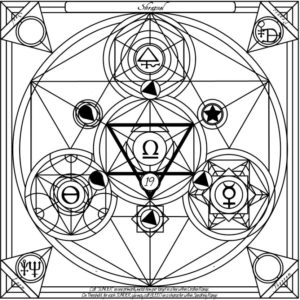
The Arcane
Each Spell has a written formula that depicts in detail all relevant information in the form of an arcane array. This array and its relevant information in total is called an Arcanum (Arcana plural). In an encoded form, the Arcanum explains all of the details of the spell, from its overall power, its duration and its range, to the effect it will produce, and how to cast the spell. Any trained Magician who is handed an Arcanum should be able to understand by reading it the purpose and casting of the spell it depicts, and can do so as soon as they read it thoroughly enough to understand the information contained on the page.
The Arcanum’s intricate formulae also include what are called its Axioms, a set of complex mental ideas that are difficult or impossible to communicate to others, even though the Magician can grasp them as she reads it. The Magician’s training and overall understanding of the magical forces of her Elemental Principle allow her to apprehend the deeper tacit knowledge that the Arcanum expresses. Axiomatic information is why a very skilled Magician of an opposing Guild cannot simply cast spells of another Element, even should they have a stolen spellbook in their hands.
Each piece of information corresponds to certain requirements in casting. The Arcanum will explain the spell’s maximum Range, its Duration of effect, and the overall Power that it has to create its effect in the world. The kind of spell it is and what it affects is called the Domain, and each Element controls a number of Domains. How spells are constructed in more detail is discussed in Spellcraft.
Complexity and Acuity
Casting a spell is a combination of intense information processing and channeling unbridled magical energies through the Magician’s mind and body. The experience is different for each of the Guilds, each magical discipline being performed differently, but the experience is always incredibly intense, something akin to performing advanced mathematics in your head while on being on fire or drowning. As such, it is a godlike feat of will each and every time it is performed.
Acuity is the sum total of the Magician’s Intellect, Resolve, Courage and Academics, and then an additional 3 times the Magician’s Circle Rating. For instance, a Magician of the 2nd Circle, who had Intellect 2, Resolve 1, Discipline 3 and Academics 4, would have a total Acuity of 16 (2 + 1 + 3 + 4 + 6 = 16)
Effects that increase applicable Skills or Attributes (such as spells, drugs, Hope or Devotion) all increase Acuity as well.
Water Magicians use Faith and Zeal instead of Intellect and Academics to derive their Acuity.
Each spell, while the product of rigorous testing and refinement, is a carefully calibrated set of instructions that can be easily understood and even performed by anyone with the correct training and enough magical power. As spells become more powerful, they gain more Complexity, and require more power and more intellect and training to perform successfully.
The Magician’s Acuity is her ability to successfully navigate the turmoil of spellcasting and to yoke and wield magic at her command. This raw potential is a measure of her overall will, confidence and skill, the orderly nature of her mind and spirit, as well as the magical power crystallized in her from her access to the deeper Circles of mystery.
Complexity can be found in the small circle in the center of the Arcanum.
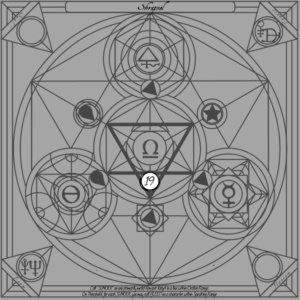
Every spell has a Complexity rating, and the Magician’s Acuity is compared to the Complexity. If the Magician has equal or more Acuity than the Complexity of the spell, she can cast the spell as much as she likes with no risk. If the Complexity is too high by 5 or less, she can still cast the spell, but the stress of the spell will put her mind at risk (See Maelstrom, below). If the Complexity is any greater than 5 over her Acuity, the spell is just too difficult to cast.
Spellcasting
In order to cast a spell, the Magician must perform all actions prescribed on the Arcanum page. Casting a spell requires that a magical incantation be spoken, arcane signs be performed, and that the magician perform feats of complex mental effort, all specific to the spell involved.
Incantation
The incantations are sets of magical phrases that correspond to concepts in the Lingua Arcana of each Guild. The total incantation confers all of the information about the spell, and a clever Magician can listen to an Incantation and know a great deal about the magic that is being worked.
The Incantation has three parts:
The Element Phrase
The Element Phrase focuses the Elemental Principle and prepares the spell’s alignment along that principle. The Element Phrases for each Element are as follows:
Deflagrate Ignis et Auctorita Luminos Dextera ex Anima Solarius Praepotentia
Relix Narez Relit Mamuri Worum Sicun Gundavult Vorug ta Verg Tyra
Lurelin Liden Lolthvidorin ay Ladurianim Soladuanadihl Karulieal va Torinim
Ibatoran Hahm Put Halo Tahom Sois Oran de Ibat Fulos Kei Sei Fulos ibi Aran
Domain Word
Each Domain corresponds to a specific astrological sign, and each sign has its own Domain Word.
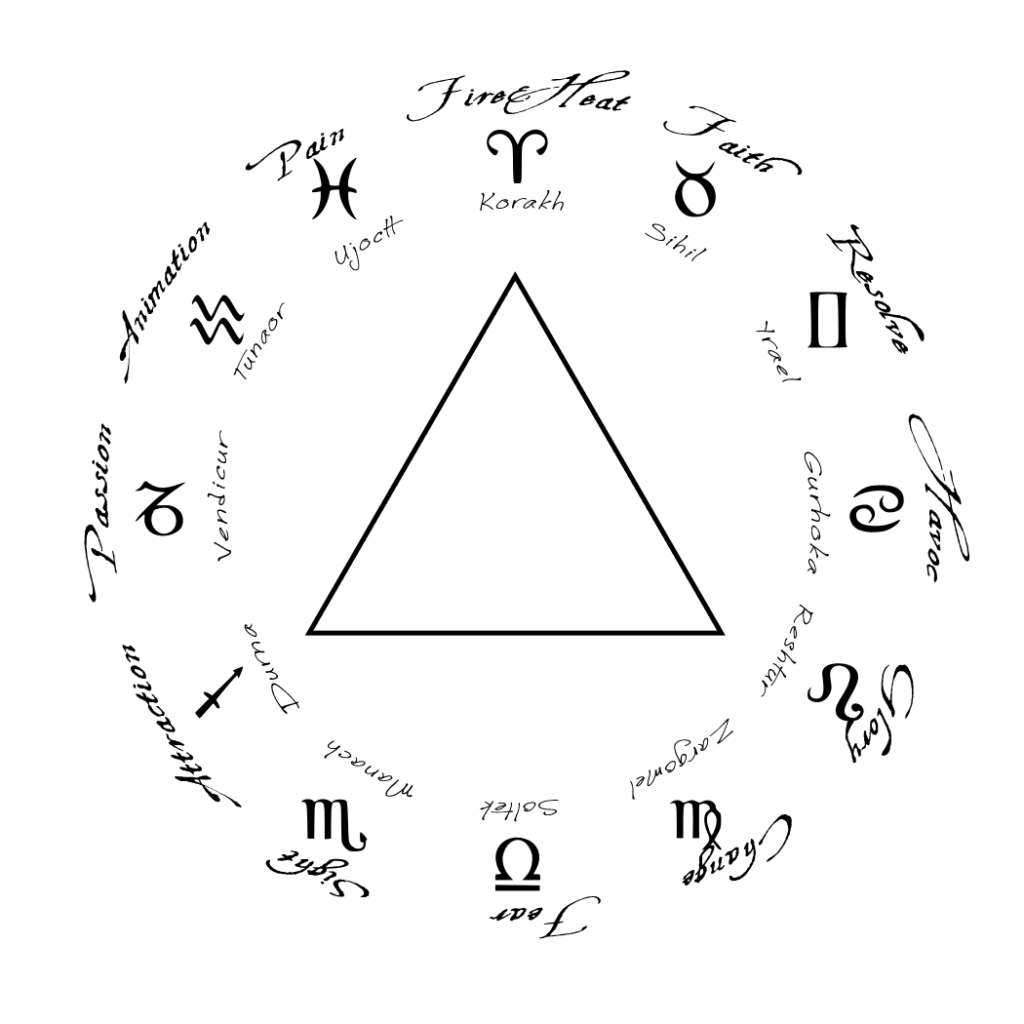
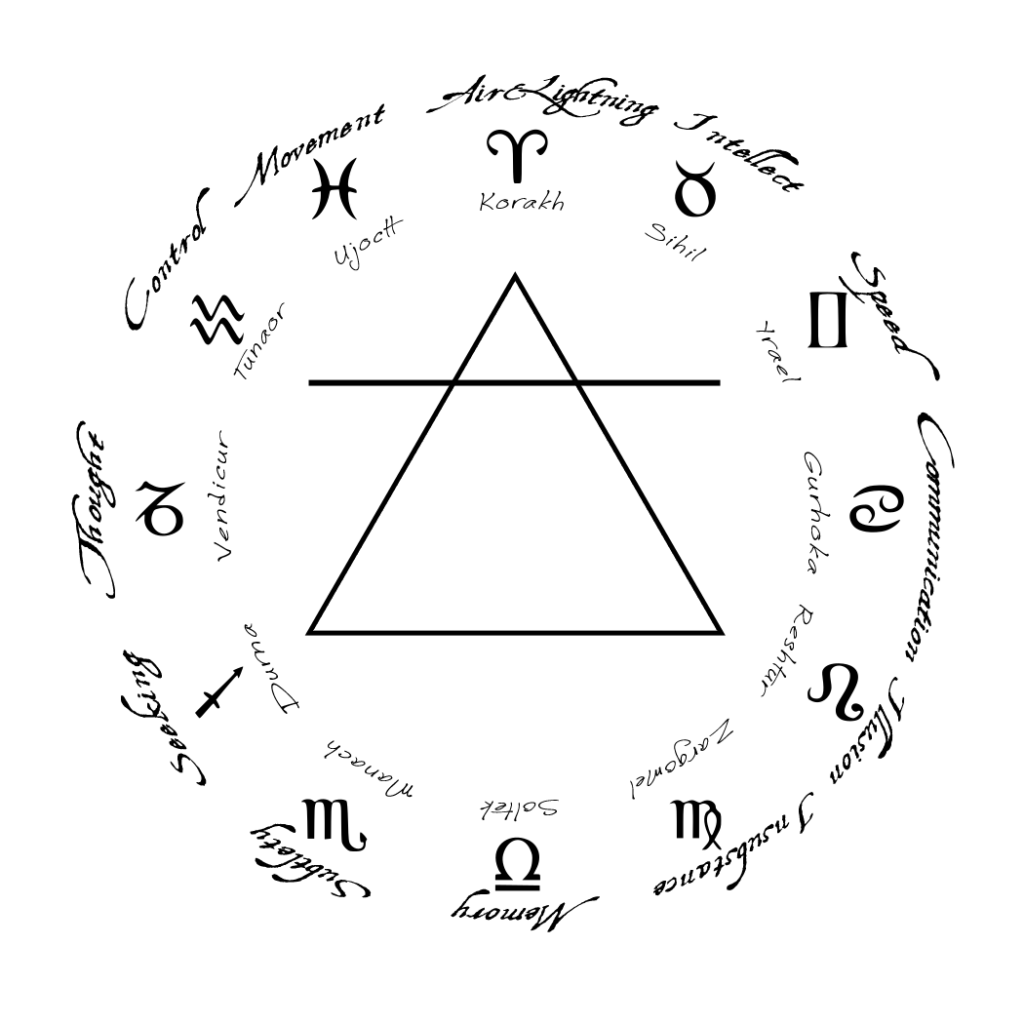
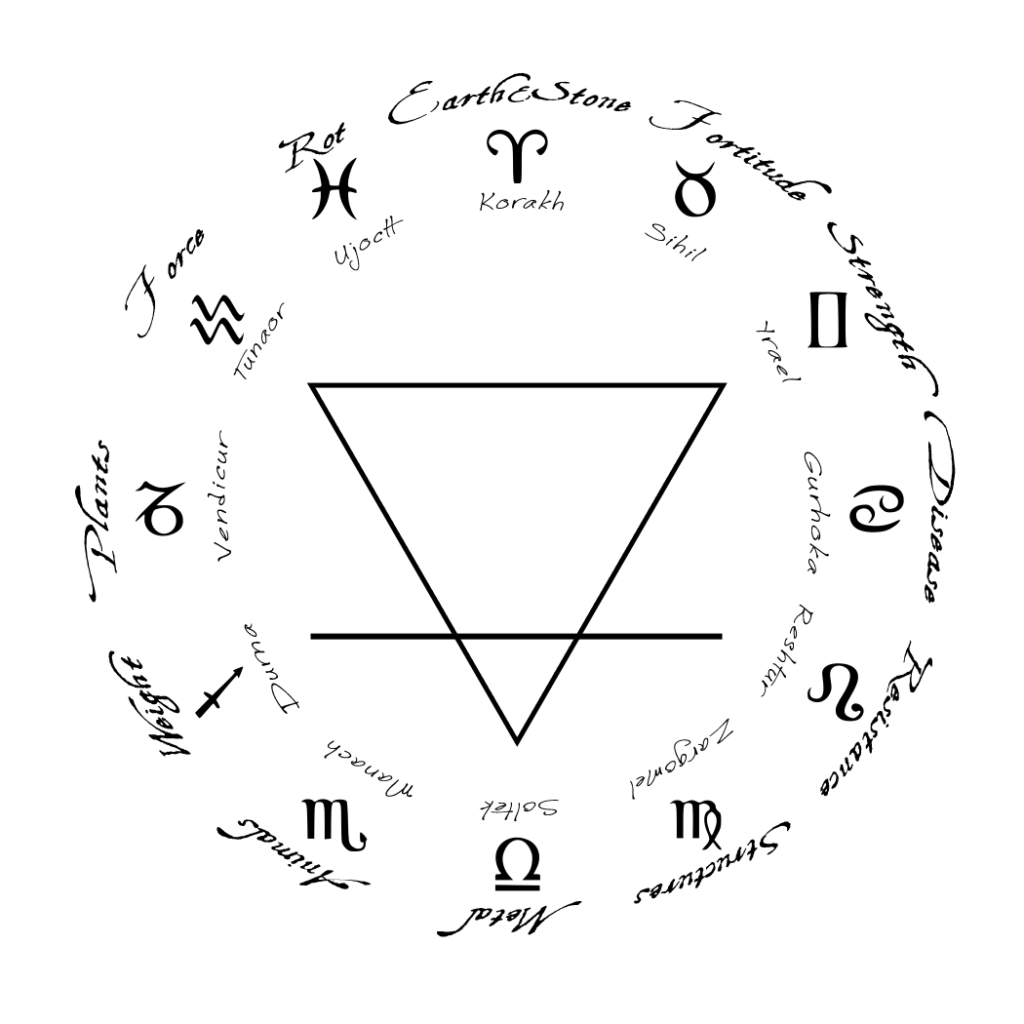
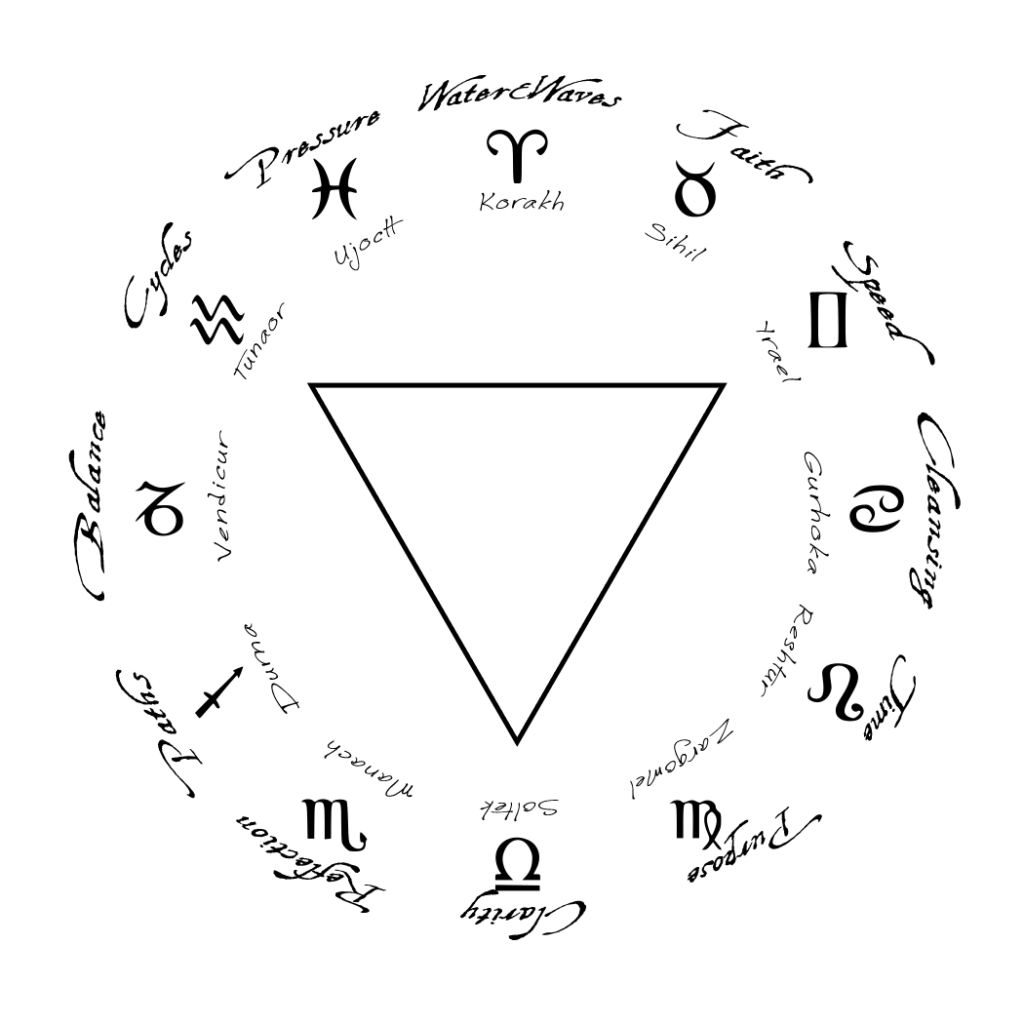
The Full Incantation
Every spell has a basic Incantation that follows this pattern:
Element Phrase – Domain Phrase – This line’s Power, This line’s Range, This line’s Duration
This is repeated for each “line” of the spell, as long as there are more Power, Range or Duration left unspoken. For example, an Earth Element Metal Domain spell had Power 3, Range 2, Duration 1, the incantation would be as follows:
“Relix Narez Relit Mamuri Worum Sicun Gundavult Vorug ta Verg Tyra” – “Soltek” – “Nairuk” – “Leinarat” – “Leizal”
“Relix Narez Relit Mamuri Worum Sicun Gundavult Vorug ta Verg Tyra” – “Soltek” – “Nairuk” – “Leinarat”
“Relix Narez Relit Mamuri Worum Sicun Gundavult Vorug ta Verg Tyra” – “Soltek” – “Nairuk”
The full incantation can be spoken as fast as the Magician is able to speak it accurately. Techniques exist which make it possible to complete the Invocation more easily and speedily. The Magician must speak the entire Incantation with a powerful oratory voice; below shouting but above conversational volume.

Spell Attributes
The Attributes of the spell are the Power, Range and Duration that determine how effective the spell becomes once cast. These too have words of power that represent them: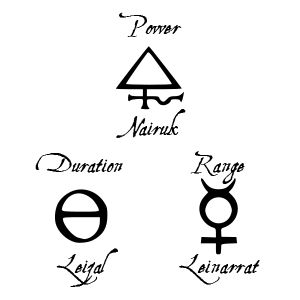
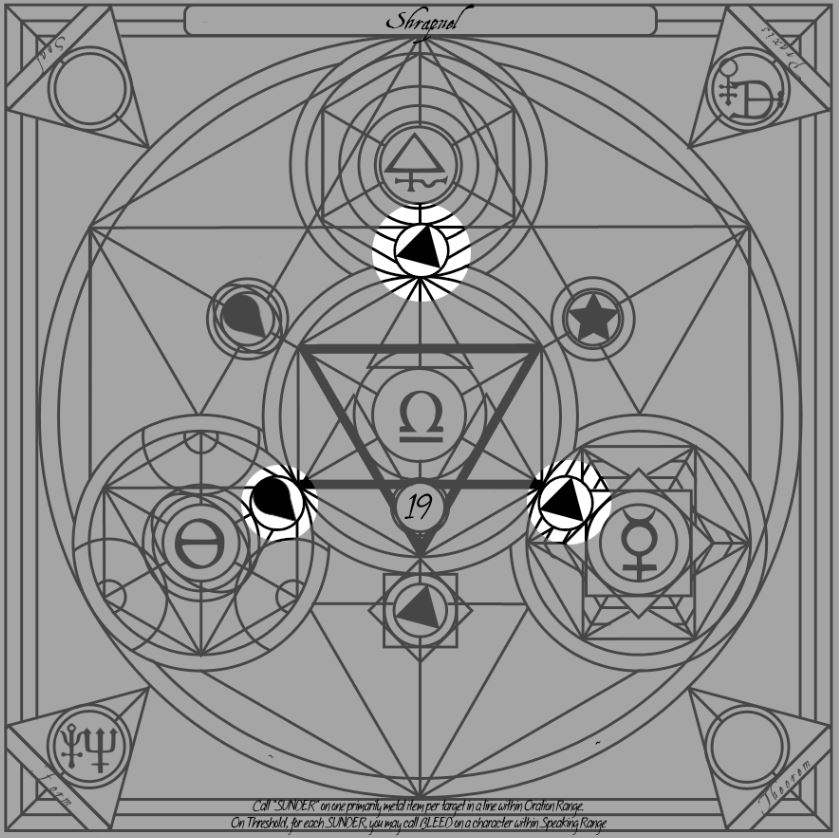 A spell’s Power, Range and Duration can be found in the circular sections next to the symbols for each. The quantity of outward facing points on the shape represents the number for each.
A spell’s Power, Range and Duration can be found in the circular sections next to the symbols for each. The quantity of outward facing points on the shape represents the number for each.
The Full Incantation
Arcane Signs
Signs are gestures performed with the hands that invoke arcane power and shape the spell as it is being cast by the Magician. The gestures involve precise gestures with the hands and fingers, and they are used to work more specific effects into the spell that change the shape or other effects of the spell, or cause them to be come more powerful, protect the Magician while she casts, or other sorts of effects. These abilities, called Techniques, are described in more detail here.
Performing Signs requires the full use of the Magicians hands and fingers, which means that she cannot work them while holding weapons or shields, or wearing any restrictive armor on the hands. Not every spell requires the use of Signs – spells that utilize no techniques can be cast with only the Invocation.
There are 12 Signs, in all, and every Technique is made by combining one or more of these Signs.
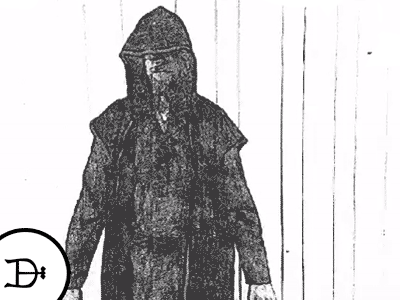



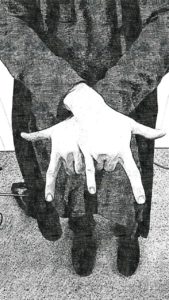
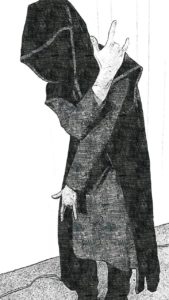
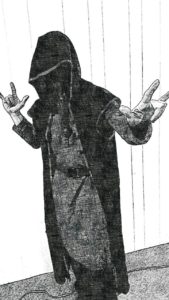

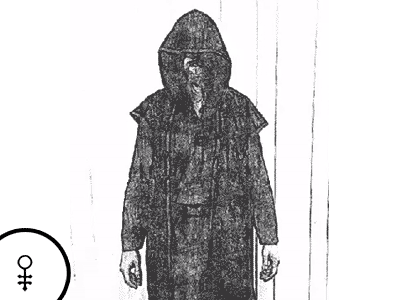
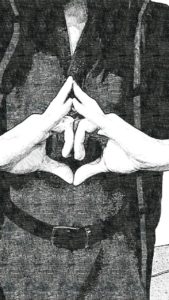
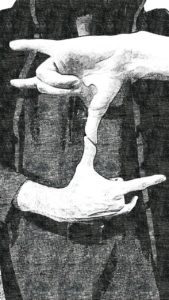
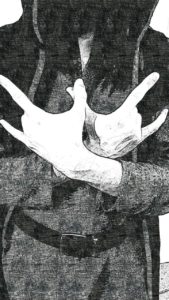

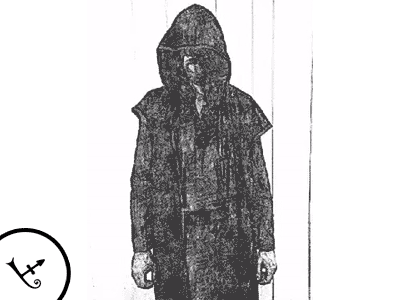

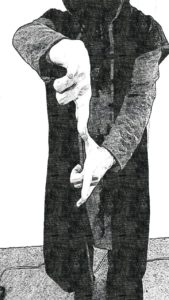
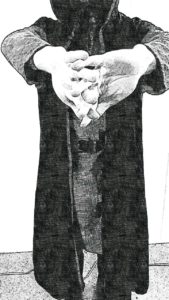
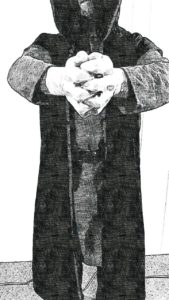
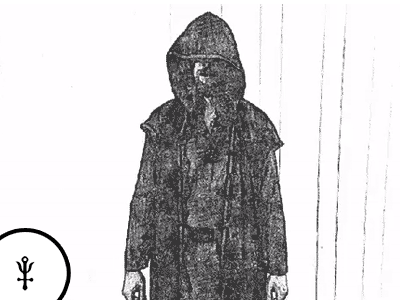
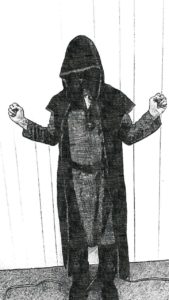
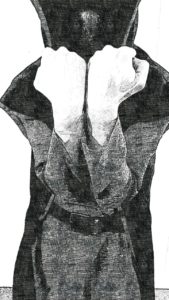


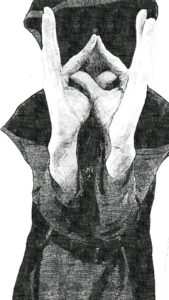

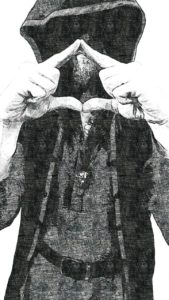

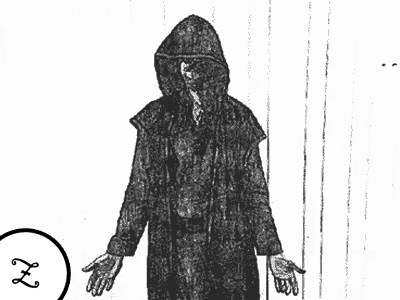
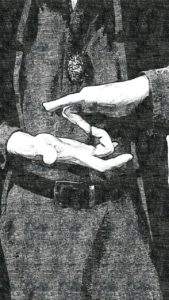
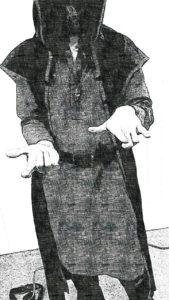
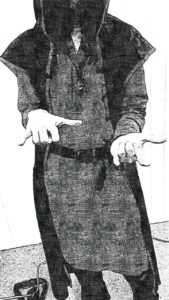

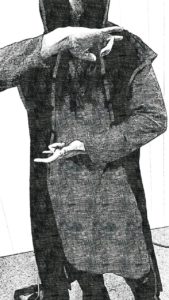
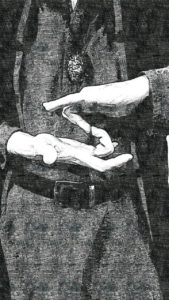
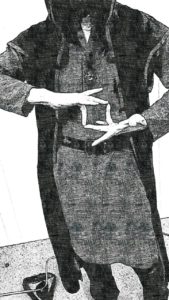
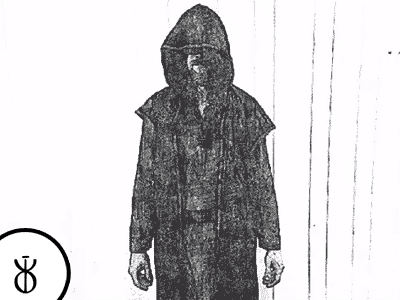
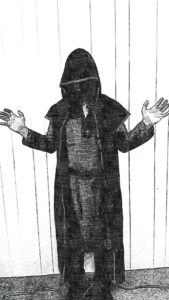
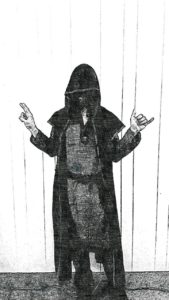

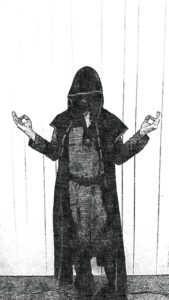
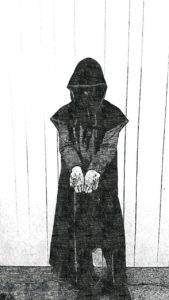
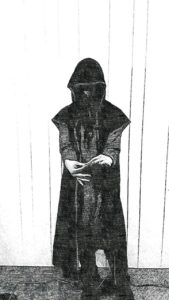
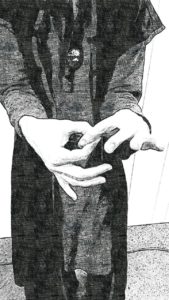
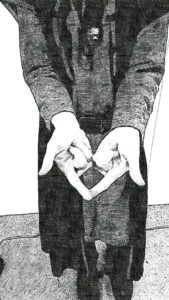



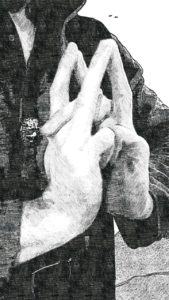

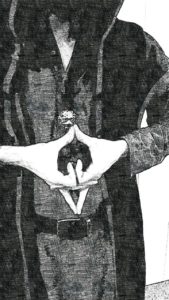
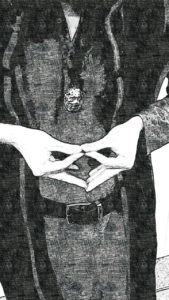

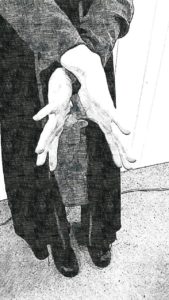
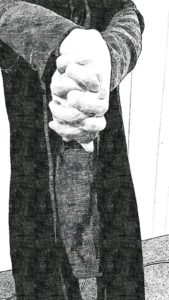
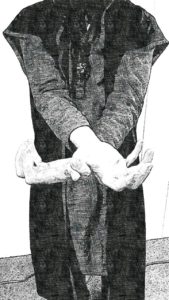
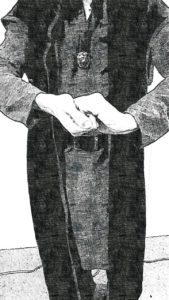
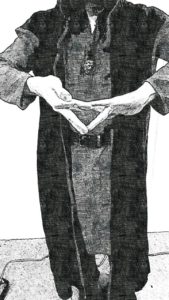
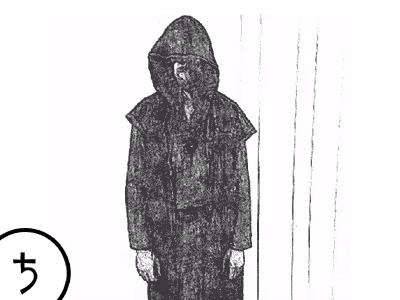
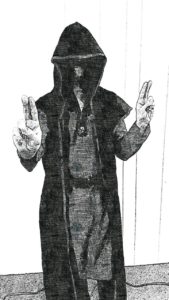
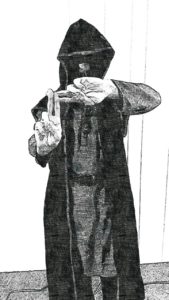
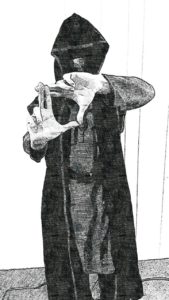

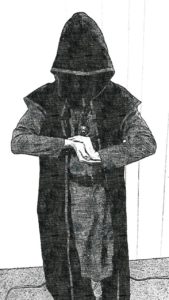


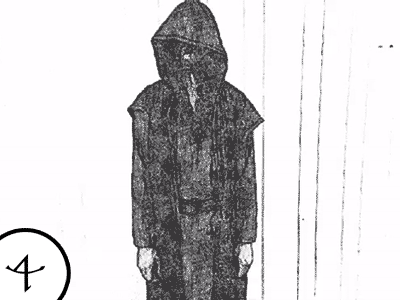
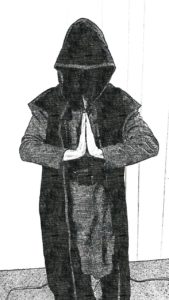


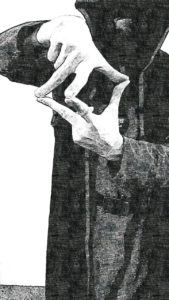
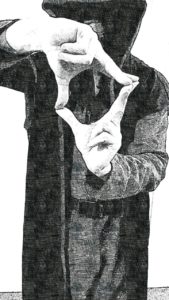


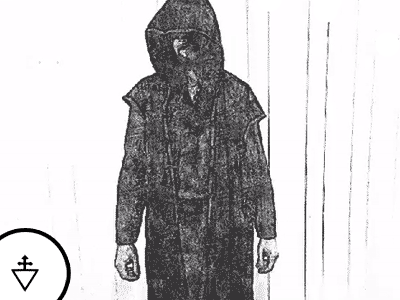
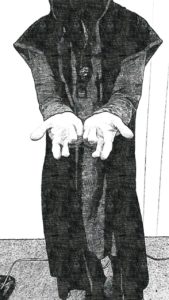
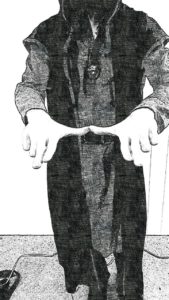
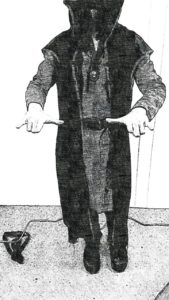

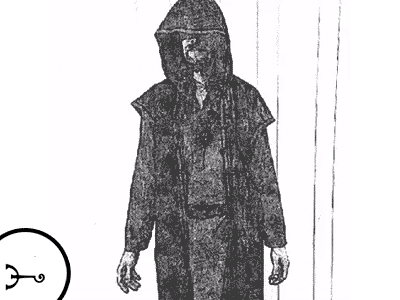
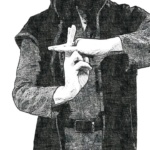
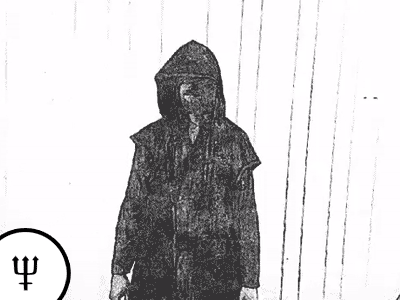
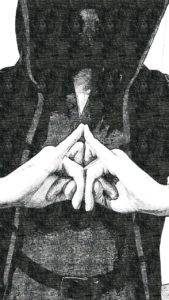
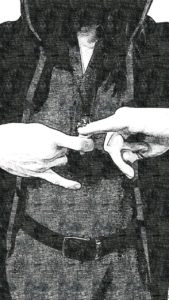
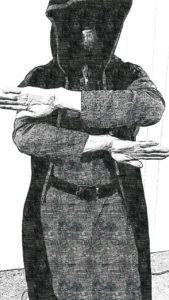
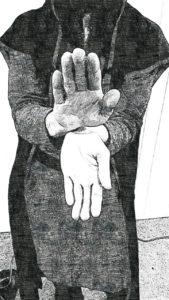
Each Sign is represented by a symbol, which must be performed in order. The symbols prescribing which Signs to be performed are found in four areas:
Techniques begin with the Praxis and proceed clockwise through Theorems, Forms, then Seals, and Signs should be performed left to right within each area.
Interrupted Casting
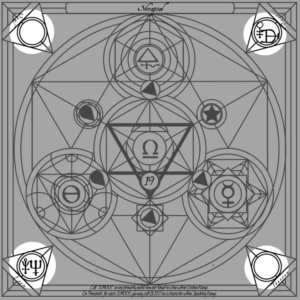
Fallacies and other Restrictions
Some spells have been designed in such a way that makes them less mentally rigorous, thus lower complexity, by adding additional steps or restrictions, or by making the spell less safe to cast. These flaws, called Fallacies, are written within the Arcana and must be obeyed for the spell to function at all.
For more information about Fallacies, see Arcane Techniques and Spellcraft.
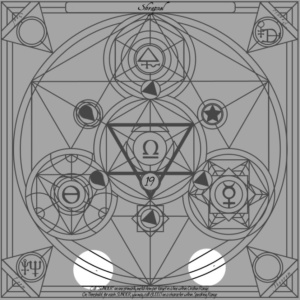
There are certain conditions under which Spellcasting cannot be performed. Most obviously, if the minimum requirements of the spell cannot be met, such as the Magician is physically bound and unable to perform Signs, gagged and unable to speak the Incantation, or without specific components or preparations required by Fallacies. The Magician also cannot muster the mental clarity to grapple with the immense magical forces required if they are Afraid, and conditions such as Despair and Battered might cause their Acuity to be reduced to the point that they lack the ability to cast the spell, or cast it safely.
The Casting and its Effect
The factors of the spell can be done in any order, or simultaneously, so long as they are performed accurately. Small inaccuracies from sloppy invocations or signs may allow the spell to succeed but cause Anacrusis, discussed below, while serious failures will cause the spell itself to fail. Once the spell is complete, the Magician gestures forcefully toward their target and calls out the actual game effect of the spell so that other players know how to react, which will be listed on the Arcanum.
Spells always include their Quality when they call a game effect that originates from magic, such as “Flame Fear”, “Stone Block”, “Lightning Dodge”, or “Water Strike”.
In the case of any Enchantment spell, the Magician must speak the name of the spell to the recipient in order to complete the spell. The name of the spell contains axiomatic details, and is spoken as in-character information.
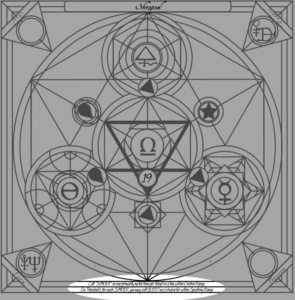
The Spellbook
Because of the difficulty and detail required to cast the spell, the Magician must have access to her Arcana in order to cast her spells. She is assumed to regularly peruse and refresh herself on the details of her Arcana periodically to maintain her familiarity with it. For this reason, Magicians almost always have and maintain a spellbook with every Arcanum they know and keep it precious and secure. If she loses access to her spellbook or a specific spell within for more than one Chapter, she loses the ability to cast that spell until she gets another copy of the missing Arcana.
Maelstrom
Some spells represent forces too powerful or arcane to be controlled by less experienced and powerful Magicians. These spells demand forces that can crack the mind like glass, leaving it changed by the experience and susceptible to even greater damage next time.
This manifests as Maelstrom Dice. For each level of Complexity not absorbed by Acuity, at first opportunity, a Rules Marshal or Staff member will roll one Maelstrom Die, which are ten-sided dice. On a 6 or higher, the result is a new Insanity or advancement of an existing one. A Magician may spend Discipline to re-roll the result.
Even with the risks, casting spells that are too dangerous for the Magician might be prudent in an emergency.
Spells come in three basic types – Enchantments, Forces, and War Magic.
Enchantments
Enchantments are those effects which target a person and then change something about that person, with the effect staying with the target regardless of where they go. For instance, a spell to increase a character’s Strength Attribute would be an Enchantment, as would something that caused a person to be sneakier, or less sneaky. Because Enchantments change aspects of the target, they cannot usually be directly damaging effects. For these spells, the effect is called just once on the character and lasts for as long as the Duration of the spell says it does. Enchantments can be on a place or an object as well. Especially for Enchantments, Anacrusis, discussed below, should also be considered.
Forces
Forces are effects that are exerted upon the world itself, such as a wave of force, a blinding flash of light, the production of a sound, and other such phenomena. Forces target a specific place in the world (such as directly in front of the Magician, or at a target within close range) and they exert their effects on anyone who falls within that space. The effects continue for the Duration of the spell, and anyone in the area of effect has whatever it does to them re-applied and any appropriate calls made again every Beat they are within that space. For instance, if an Earth Magician caused an earthquake within an area, the Magician could call “Knockdown” on anyone within the space every Beat for as long as the spell’s Duration remained.
Evocations
Evocations are the Magicians power, weaponized. Spells configured into Evocations can be cast much more rapidly than traditional spells, though they must be fairly simple. Instead of the Incantation, these spells use the Evocation, which follows the following shortened form:
Element Phrase – Domain Word – All Power words, All Range words, All Duration Words
As a Magician grows more powerful, they may unlock arts that increase the speed of their Evocation even further.
(Read more about Techniques)
Magicians usually use Evocations for battle magic, using their primary elemental Domain with spells igniting zones of roaring flames, crushing enemies with boulders or stone spikes, electrifying enemies with bursts of lightning, or smashing the force of the tides against their foes – usually spells that call Strike to directly damage their opponent. However, any spell that must be performed rapidly can be cast as an Evocation, such as defensive spells to protect the Magician, escape from danger, or to wipe the mind of a witness who saw something they should not have.
Evocation spells have an important restriction, however, and may only be Lesser or Standard Effects.
(Read more about Spellcraft)
In game, Evocations are performed by completing the casting, then gesturing forcefully at the intended target while saying the appropriate call. The tighter the grouping of possible targets, the more precise one needs to be if indicating a specific individual. If the target of the spell is unclear, it hits the closest person you could have been indicating. For spells that affect an area, such as using the Blasting Form Technique, the range is measured from where the magician gestured.
ANACRUSIS
Anacrusis is the name Magicians have given for a series of conditions that arise from overtaxing a subject, area, or object with too many competing magical forces. For any kind of Enchantment type spell, the Magician must also tell the subject how many Anacrusis Points they take along with the spell call, “Such as “Set Intellect to a minimum base of Sound, 1 Anacrusis Point”. If necessary because of many Anacrusis Points, the Magician will check which Anacrusis effects the subject now falls under. For more information, see Anacrusis.
Magical Conditions
There are some special conditions that only affect the process spellcasting. These are usually the result of specific Techniques that cause them in order to disrupt enemy Magicians, though they can be the result of other events, including Anacrusis.
SUPPRESSION
Effect: The Magician finds it extremely difficult to gather and control the power necessary to complete spellcasting. She is unable to perform any spellcasting while this Condition persists. Existing spells continue to function as normal until their Duration elapses.
Resolution: Rest
CHAOS
Effect: The Magician’s magical powers are wild and uncontrolled. Every spell she casts provokes 1 Maelstrom die upon successful casting.
Resolution: Rest
FEEDBACK
Effect: The Magician’s mind recoils in fear and terror whenever it is threatened, every sensation becoming more intense. Whenever she takes an action that provokes a Maelstrom die, she is Stunned. If the effect would cause her to take more than one die, she is Stunned that many times in succession.
Resolution: Rest
BURN
Effect: The Magician’s mind is left in tatters and burned out. The Magician’s Acuity is lowered by 5. This effect is cumulative.
Resolution: 6 Hours of sleep or bedrest
Limitations on Spells and Effects
Spell effects usually have no difficulty combining if their effects are quite different from one another. However, any spell that provides the exact same bonus as another spell simply takes the best bonus of those. For instance, a Speed Spell that grants a use of Dodge does not combine with a Movement Spell that also grants a use of Dodge. Both give the same bonus, even if they accomplish it different ways.
The Spark
The Spark is a special magical condition that some fortunate or unfortunate individuals are born with. No one truly knows how the Spark occurs or why, but it does grant the bearer of the Spark some inherited power with magic in the Element for which their Spark is attuned. Each bearer of the Spark gains five special abilities. They can invoke one of these abilities per Rest. As well, each Spark grants a benefit to casting spells that invoke their specific Element.
Someone who possess the Spark for a given element cannot ever channel spells of the opposing Element. Doing so would kill them gruesomely.
The Infernal Spark
- Tada! – The user does something impressive, accomplishing anything from downing a foe to downing a beer. They and everyone friendly who sees them do this gains Hope.
- Inner Fire – The user may become immune to Pain until Rest.
- Unburnt – The user may become completely immune to any effect with the Flame Quality or other sources of heat until Rest.
- Remorseless – The user may add Power to one Social Condition use.
- The Dragon – The user may take one Maelstrom die and permanently change their Devotion – until they change it again, that is. The user can immediately enter the Devoted condition when appropriate, but can only achieve a Personal Victory for a Devotion they’ve had at least one Event.
The Infernal Spark grants the ability to increase the Power of War Magic spells by up to 3 spending a Maelstrom die each.
The Telluric Spark
- The user may intuitively understand animals. They may talk to a Storyteller to confer about what woodland creatures would know.
- The user may call Slam on someone they touch.
- The user may cure themselves of any Disease.
- The user becomes extremely heavy, becoming immune to Staggering Effects as long as they do not move.
- The user may take one Maelstrom die and gland themselves any single Drug trait. This is considered a “Slow Acting” drug, and multiple uses over time combine.
The Telluric Spark grants a passive resistance to Anacrusis from the Magician’s own Enchantments cast upon himself. The Magician takes 1 less Anacrusis from their own spells than normal, in addition to the normal resistance all Magicians have.
The Tidal Spark
- When struck, whether defended against or not, the user may call Strike on the opponent which struck him, as their own force is reflected.
- The user may purge their body of drugs of all kinds.
- The user becomes emotionally calm, and is immune to Fear and Cower until rest, or recovering from Trauma.
- The user may instantly grant himself Hope.
- So long as the user is not currently dying, he may instantly recover from the Battered condition, taking one Maelstrom die.
The Tidal Spark allows the user to expend their Aa’boran Meditation bonus while casting a spell to Seal it within a special Seal that works under any condition the user wishes.
The Aerial Spark
- The user may seamlessly blend into crowds of 5 or more, using the Ignore sign.
- The user may open any lock or latch.
- The user may silently communicate a simple idea to someone they know, no matter where they are.
- The user may perform a tumble, and call Block.
- The user may (optionally) have a Storyteller or Rules Marshal order someone to do a simple command via Obey as if it were their own idea. Discipline may resist this. This costs a Maelstrom die.
The Aerial Spark allows the user to expend Willpower to cast a Non-War Magic spell on anyone they know fairly well, regardless of where they are in the world.
